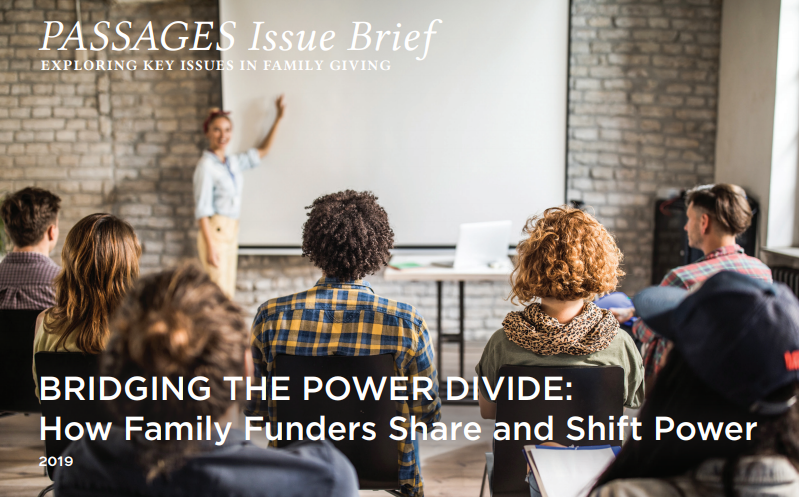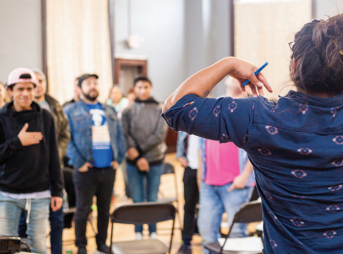Name, Claim, and Share Power: Perrin Family Foundation (Passages Issue Brief Excerpt)

As a family funder, how can you acknowledge and responsibly navigate the power of your position? How does the power and privilege you hold affect those you interact with and support? How can you use your power for good—to make lasting impact?
This Passages Issue Brief features stories, perspectives, and practical tips on power, and suggestions for how family funders can work toward bridging the power divide with grantee partners and the communities they care about. Enjoy this excerpt from Bridging the Power Divide: How Family Funders Share and Shift Power, featuring the Perrin Family Foundation.
The Perrin Family Foundation staff has a built-in reflex when it comes to unpacking the power dynamics in any room or space, says Laura McCargar, president. “We have an institutional commitment to exploring how we hold power. As a staff, we work to move this learning inward, in our own personal self-reflection, upward to our board, as well as outward to our philanthropy colleagues.”
You can’t fully neutralize or eradicate power dynamics in grantee-grantor relationships, McCargar says. “We don’t want to advance the power equivalent of the problematic ‘color-blind’ trope. Just like we cannot be blind to the legacy of white supremacy, we cannot wish away power differentials because it generates discomfort. It is important to own and name the power a foundation carries for what it is, and also genuinely see, respect, and trust the power of the people who are working on the ground. Build a table where community folks can show up unapologetic about their own worth and power.”
For family funders, she asks this: “How can you hold the reality of the power you have—the reputational power, the resource power—to fund the work and influence the field in a way that is responsive and accountable to the communities you work in and with?” When in meetings with grantees or community members, here are a few ways McCargar names and navigates power:
- Name the dynamics. “I recognize that I come as a representative of a family foundation, and there is inherent power in that position.”
- Ask them to self-define whether the funder should be present. “If at any point you think it’s not appropriate for me to be in the room, please speak up, and I’ll step out.”
- Model the behavior of stepping out when appropriate. “It seems you all are having a layer of conversation that I shouldn’t be here for, so I’m going to step out.” (And then leave the room.)
McCargar notes this has also required recalibrating the foundation’s own expectations around power. “There have been moments when we’ve felt like we were taking up too much space in the room, but our partners have seen it otherwise. Our presence is an important part of demonstrating our commitment to relationship and accountability.”
Look at how you operationally perpetuate power.
Location matters, says McCargar. “Our office used to be in Ridgefield, Connecticut—an affluent community where the family grew up. This wasn’t reflective of or accessible to the constituents we support. We then moved to a New Haven co-working space, sharing the same floor with some of our grantees, giving them real and immediate access to the foundation. They would sometimes pop into our office, plop down on the couch, and ask: ‘do you have a minute?’ It shifted our relationships with them.”
Today, the foundation resides in an independent office space located in a multi-use building, sharing the location, meeting room space, and convening areas with its grantees and other creative nonprofits.
Use your mission to move and share power.
 In 2012, the Perrin Family Foundation implemented a new mission focused on partnering with organizations in under-resourced communities across Connecticut to support youth as leaders of social change. They are now asking themselves: what does it mean to move forward with this commitment?
In 2012, the Perrin Family Foundation implemented a new mission focused on partnering with organizations in under-resourced communities across Connecticut to support youth as leaders of social change. They are now asking themselves: what does it mean to move forward with this commitment?
“The foundation has a commitment to funding youth-led social change: We don’t define our grantmaking by issue areas—our focus is youth organizing. This creates the room and space for community leaders and groups to define for themselves what the priority work is. Folks don’t have to contort themselves to get funding. It has supported the power of communities to define what their priorities are, and it has enabled a more powerful network—supporting power building on the ground,” says McCargar.
“It also means we have a dynamic group of organizations that work across geographies and issue areas, with an intersectional lens. This creates room for communities to build power themselves, without having to compete over which issue is more important,” she says.
“Philanthropy gets to define so much of what’s important based on what they prioritize in terms of dollars. Because the Perrin Family Foundation funds the process rather than a particular issue, that helps minimize some of the inherent power dynamics, and supports power building,” says McCargar.
There is a flip side to this, though. “Sometimes when there have been opportunities to lean in and exercise our institutional voice, the board has said, ‘we don’t take stands on particular issues.’ It’s been a double-edged sword, but we can’t shirk our power when it feels risky.”
Learn alongside each other.
There’s big benefit to board and staff coming together in conversation about power. “The process is a learning opportunity in itself, and every bit as valuable as any outcome that comes from it,” she says. “As a staff, we can hold education and learning spaces for the broader board in some ways that family members cannot,” she says.
She encourages more family foundation boards and staff to have these conversations.
“There is not a lot of room in family philanthropy for people to do a personal mapping of power they hold, and that their families have held for generations,” she says. “We need to have space to process the origins of privilege—and what that means to each of us, as individuals, as families, as foundations.”
View and download the full Passages Issue Brief on NCFP’s website.
